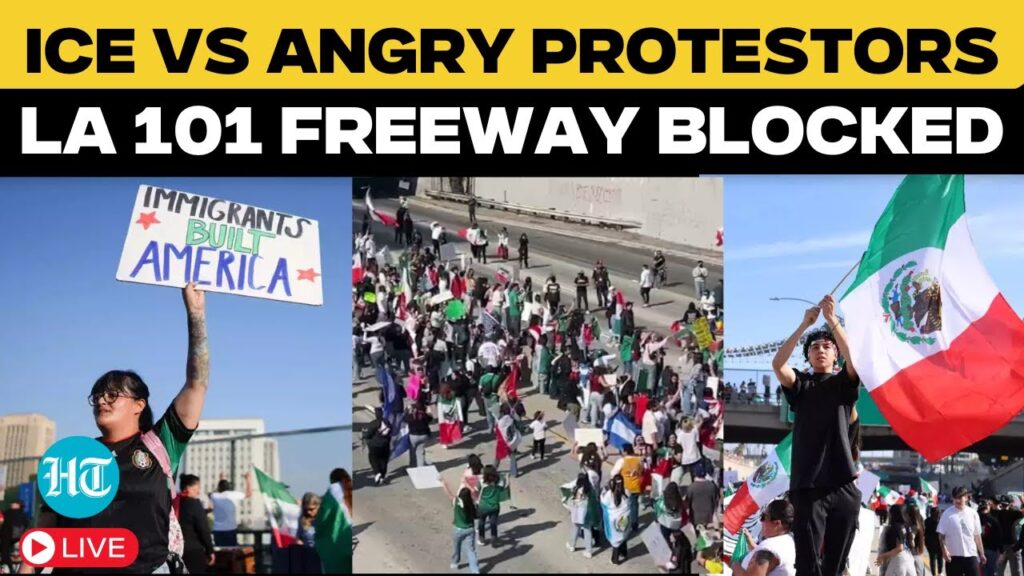Protests against the Trump administration’s hardline stance on immigration have surged across the United States, as raids by the Immigration and Customs Enforcement (ICE) continue to intensify. This past weekend, rallies took place in multiple states, with demonstrators voicing their strong opposition to the President’s crackdown on illegal immigration.
These protests have grown louder and more frequent ever since ICE raids began shortly after President Donald Trump took office. The President’s push to remove undocumented immigrants has been a key policy of his administration. Now, with his second term underway, Trump has issued a series of executive orders aimed at strengthening enforcement measures, including the rescinding of protections previously granted to certain groups of immigrants.
“I wasn’t meant for the entire world to occupy the United States,” President Trump stated early in his second term, reinforcing his hardline approach to immigration. This comment sparked further outrage among critics of his policies, especially as the raids continue across the country.
ICE officers have been carrying out raids that result in an average of 700 arrests per day. While the agency insists that it is primarily targeting undocumented individuals with criminal records or a history of illegal activity, the raids often affect many other undocumented individuals who happen to be found during these operations. Under Trump’s new orders, ICE officials have broad authority to arrest anyone they encounter, whether or not they have a criminal record.
This has led to widespread protests and a growing sense of unease within immigrant communities. Anson Foster, an organizer with the Party for Socialism and Liberation, voiced his concerns, saying, “Reject the lies that immigrants are criminals.” Foster was speaking to the wider narrative that has taken hold around the administration’s rhetoric, which often associates illegal immigration with criminality.
Although many of the most significant raids are concentrated in northern states like Chicago and Maryland, ICE operations are now expanding southward. In South Carolina, nearly 100 protestors gathered outside the State House on Saturday to protest the growing number of arrests and deportations. The rally was part of a broader movement that has seen protesters in cities and towns across the nation taking to the streets in opposition to Trump’s immigration policies.
While protests have grown, there are also many vocal supporters of the administration’s actions. Republican Representative Nancy Mace, for example, has expressed strong backing for the increased ICE raids and attended one in the Goose Creek area of South Carolina. Mace’s actions reflect her belief that law enforcement should fully cooperate with ICE to strengthen immigration enforcement.
“Making sure that we have no more sanctuary sheriff, sanctuary county, sanctuary cities in South Carolina,” Mace said during the raid. “That every single agency is working with ICE, and when they are not, we have strong enough leaders to call them out.” These statements underline the ongoing divide in South Carolina and across the country over the role of local law enforcement in supporting federal immigration policies.
The 287(g) Program has become a key point of contention. This program allows local law enforcement agencies to work directly with ICE, giving them the authority to detain individuals on behalf of federal authorities. South Carolina’s Attorney General, Alan Wilson, has been a strong advocate for this program, urging sheriffs across the state to collaborate with ICE in enforcing immigration laws.
However, the growing pressure on local agencies has caused concern among law enforcement leaders, especially in areas with limited resources. Some sheriffs, like Sheriff Foster in Newberry County, have voiced their concerns about the added strain that such cooperation would place on local budgets and personnel. “If we had to do more, we would certainly have to ask our county council and taxpayers to fund that,” Foster explained. These local authorities are already stretched thin, and many worry about the financial and logistical challenges that more ICE involvement would bring.
The debate between cooperation and opposition continues to grow as more communities are directly affected by these raids. With many individuals living in fear of arrest, and with protests becoming increasingly widespread, the issue of immigration enforcement remains a divisive topic. As President Trump pushes forward with his agenda, it is clear that immigration will continue to be a central issue in the national conversation.
The future of immigration policy in the U.S. is uncertain, as both sides of the debate continue to rally their supporters. While Trump’s administration moves forward with its crackdown, many advocates for immigrants and civil rights continue to push back. They argue that the raids not only harm families and communities but also foster an atmosphere of fear and division. As the country moves forward, it is clear that the debate over immigration will be one of the most hotly contested issues in the years to come.
Disclaimer – Our editorial team has thoroughly fact-checked this article to ensure its accuracy and eliminate any potential misinformation. We are dedicated to upholding the highest standards of integrity in our content.





More Stories
South Carolina and Other States See Protests as Trump’s Immigration Crackdown Expands
South Carolina and Other States See Protests as Trump’s Immigration Crackdown Expands
South Carolina and Other States See Protests as Trump’s Immigration Crackdown Expands